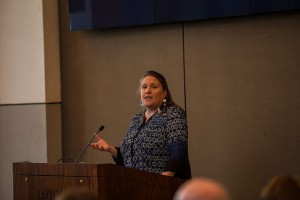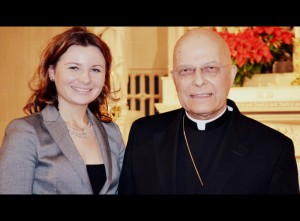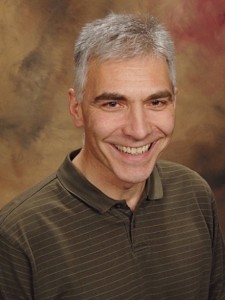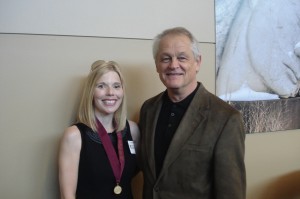At the May 2015 IPS Commissioning and Graduation Party, Staycie Flint was our wonderful student speaker. The abundance of positive feedback in regards to her address prompted us to post her speech below for those who missed it and for those who wish to read and reflect upon it again.
Institute of Pastoral Studies Commissioning
Please join me in a prayer I take from Ephesians. 1:18
“Open the eyes of our hearts, and let the light of Your truth flood in. Shine Your light on the hope You are calling us to embrace. Reveal to us the glorious riches You are preparing for Your beloved.”
When Father Steve invited me to speak today he put before me two goals: speak about the IPS student experience and inspire the graduates of 2015 forward into our future work.
At first I wanted to say no, and not JUST because I am terrified about public speaking.
I have been filled with sadness and great anger lately. Among those I love and within the work I do, I see the trajectory of this country and I am scared and mad and tired and not so sure I have it in me to be inspiring.
Then I thought, making myself talk would remind me of why we celebrate today and that we are in this world together. I could use some of that!
I came to IPS asking: “How do I belong to this world?” “Who am I to be in this world?”
I was fairly convinced that my enrollment in the spiritual direction track was the way to go for me. Until that one class with Anne Luther. The one where she states: “Our time together is about discerning as a spiritual community whether you are called to be a spiritual director.”
And the only question that rose up in me was, “If the unanimous community decision turns out to be that I am not called to spiritual direction will there be a tuition refund?”
Given that I am standing here today celebrating the receipt of my Masters of Divinity, and not a certificate in spiritual direction, I can tell you that an issue of a refund never became necessary. More importantly, I learned that the question of “How do I belong to this world?” is a question that has no final answer.
This is what I cherish and admire about IPS. In IPS, we find a place that strives to hear the world and respond out of who we’ve been created to be. IPS respects scholarship and acknowledges that theory is nothing without praxis. At IPS, what we think and believe is empty and without weight if it is not accompanied by action.
This union of theory and praxis necessitates that teachers and students be willing to walk in the light of truth – light that shines on truth and can be both harsh and beautiful, even at odds.
This is not so surprising to those of us who love this city of Chicago where on a Friday night we are cheering for hockey goals and weeping as another round of bullets perpetuates a slow motion massacre.
Philosophers, mystics, teachers, and prophets throughout the ages have taught us that the uniqueness of each individual is best seen in who they become, and that becoming is a continuous call and response process, not a sequence of events.
So. Today I share three brief reflections on this notion of becoming and answering how we belong to this world.
Reflection One: On Suffering and Becoming
“How do I belong to this world?” is a question deeply impacted by the suffering around us and within us.
And it is hard work.
The ongoing discovery of the answer to “How do I belong to this world?” is painful and often lonely.
For many of us, our hearts automatically snap shut at the sound of difficulties, hardships: suffering.
Drawing attention to the suffering around us and the suffering within us is risky and vulnerable business.
Some of us, particularly those who can, protect our hearts by withdrawing.
The closing of hearts is a practice familiar to people from all walks of life: the destitute; the secure; the invisible; the seen; the privileged; . . . often understandably so
Why else does suffering endure? Why else do the cries of the oppressed stir no action from all the world?
Sometimes withdrawing is all we know to do. Suffering often come to us as disruption.
Suffering tears us down
Suffering destroys us
Suffering never redeems
It devastates us.
When suffering disrupts our equanimity we can recoil.
We don’t want things to change. We want them to stay the same.
Or worse, we want things to change and things only stay the same.
We don’t want to feel such hardness of life: be it sadness or anger or fear.
We want to feel certain: full of hope, full of joy, full of peace.
One Friday night while I was working in the trauma center of the hospital that employees me, a 32 year old African-American woman was brought in after being shot in a drive by shooting.
As she was rushed into the trauma bay her heart stopped beating and the medical team began doing everything possible to bring her back from death. Her husband crumbled into my arms and wept until the medical team cleared the room and he could get to her side. Family joined us in the room and entered into a crying that Toni Morrison describes as “loud and long – with no bottom and no top, just circles and circles of sorrow.”
(If you have heard this sort of wailing, if you have sobbed this way, I am sad to remind you of it today and I ask that you stay with me as I continue to share.)
This family began to tell me about their beloved. She was an anti-violence activist. She was shot just outside her home after arriving home from an anti-gun-violence fundraiser she and her life long friend and colleague had planned for months. As this family raged and sorrowed into their long grief her friend began to weep and repeatedly say to her beloved’s family, “This is my fault. I shouldn’t have asked her to be part of this. This never would have happened had we just stayed out of it!” and the family responded with, “Don’t say that. It is not true. She needs you more than ever to keep doing this work. We need you more than ever. Please. Please. Please. Don’t. Stop.”
And I can tell you, this dear departed’s friend hasn’t stopped and the movement has grown stronger and is making a difference.
So. We have to be brave. We have to be vulnerable. Though we may need to pause, we can’t stop. We have to hear the cries of this world and how they mix with the cries of our own hearts and we have to continue to answer for ourselves “How do I belong in this world?”
There is a way IS A WAY of engaging suffering that opens us up and leads us to action.
Your work of becoming and answering “How do I belong this world?” will go forward as you find your own particular ways of embracing, RESPONDING, to the calls of suffering.
Reflection Two: On Relationships and Becoming
David Whyte writes:
“Human beings are creatures of belonging, though they may come to that sense of belonging only through long periods of exile and loneliness.”
“How do I belong to this world?” is the question we must keep finding answers to amidst the calls of relationships with our selves, each other, and our Maker.
In the face of the loneliness and exile of suffering we must attune ourselves to the Maker of Hearts whispering to us through relationships:
the hands of caregivers
the rhythm of the liturgy
the transparency of song
the largess of creation
the attentions of loved ones
and in ways that only we can hear
The Whisperer persists in saying our becoming… my becoming…. your becoming… does not happen in isolation.
In fact, we’ve been given boundless hearts fully capable of becoming. Your relationships will open you to your unfolding.
One born into an ultimate box that was terribly void of relationship to the world around her, Helen Keller was lifted into her own becoming through relationship with her Teacher Anne Sullivan. Over time she found her own way into an abundance of relationship with the whole world and it wasn’t always accepting.
In a letter to Senator Robert La Follette, Helen Keller wrote:
“So long as I confine my activities to social service and the blind, they compliment me extravagantly, calling me ‘arch priestess of the sightless,’
‘wonder woman,’ and a ‘modern miracle.’ But when it comes to a discussion of poverty…that is a different matter! It is laudable to give aid to the handicapped. Superficial charities make smooth the way of the prosperous; but to advocate that all human beings should have leisure and comfort, the decencies and refinements of life, is a Utopian dream, and one who seriously contemplates its realization indeed must be deaf, dumb, and blind.”
See, there is a risk in becoming and living the wholeness of ourselves. It will not always be received well by others.
Dr. Audre Lorde said:
“There’s always someone asking you to underline one piece of yourself— whether it’s black, woman, mother, dyke, teacher, etc.—because that’s the piece that they need to key in to. They want to dismiss everything else.”
I highlight this resistance because I want to acknowledge that we can’t be about our becoming without claiming our relationships to our social location and how it engages the social location of those around us.
Responding with a critical self-awareness to the call of relationships that resist us and seek to limit us is as important to shaping our becoming as the response to the call of the encouraging relationships.
Hellen Keller needed for her becoming the pretentiousness and devaluing of a senator as surely she needed the support of Anne Sullivan to live into her becoming.
Martin Luther King Jr. needed the ignorance and cowardice of Bull Connor as surely he needed the inspiration and guidance of Howard Thurman to stretch fully into his becoming.
Audre Lorde insists that we need all the relationships, not just a couple, with ourselves and others in order to live into becoming.
The holding and responding to ALL the relationships in our lives are simply different expressions of the central way we belong to this world.
In truth, the work of becoming puts the whole wide world in relationship with us and us to the world.
Reflection Three: On Becoming and Belonging to Our Maker
One of the most powerful things Christianity teaches the larger world is that a tomb of darkness can give way to life unmeasurable.
And this is the hope and assurance we have.
In our becoming we are connected to a source of life that goes way beyond our earthly days.
Dr. Howard Thurman, spiritualist and mentor to Martin Luther King, frames our becoming in this way. He states:
“Don’t ask yourself what the world needs. Ask yourself what makes you come alive, and go do that, because what the world needs is people who have come alive.”
When you are answering “How do I belong to this world?” don’t forget that the answer best speaks to how your Creator has made you to come alive!
Also don’t forget that your source of this life is a boundless Divine who has become all things – not just a few things, all things. As Reverend Osagyefo Uhuru Sekou of Ferguson and Baltimore reminds us,
“We have seen the face of God, and God has got tattoos on God’s face, and God sags God’s pants, and God is angry and God is queer.”
One of the few promises in life that I am comfortable making is that the Maker and Keeper of hearts gives life and sustains our becoming with a boundless heart that knows no limit.
I close by wondering what awaits you? What awaits you as you go about the continual work of answering “How do I belong to this world?”
The world calls out to us through earthquakes, hungers, and broken spines. It whispers to us through a grieving co-worker, a beloved’s bad day, and our own weariness. What will be your response?
The more we trust and practice being open to the call and response of all that surrounds us― the good, the bad, the ugly―the clearer it becomes that it is not the events of our lives that define us but rather how we belong to this world―how we respond to the calls―that defines the events of our lives.
I learned through my time here at IPS that answering “How do I belong to this world?” is found in my ongoing responses to the calls of suffering, relationship and our Maker. When I realized that my calling wasn’t clear, the response to me from the likes of Fr. Krupa, Dr. Russell, Dan Lunney, Dr.s Evelyn and Jim Whitehead, and Dr. Lysaught was, “we will help you be who you are to be in this world and we won’t ask you to be who you are not.” I trust that most of you graduating with me know something of this gift. I hope you replicate it in the world.
I remind us of Dr. Lorde and paraphrase a conversation Krista Tippet shared with Courtney Martin and Parker Palmer when I point out that we are often asked to show up in life as only “slices of ourselves.” To feel like we’re showing up as our whole selves in all the settings of our lives is a rebellious act.
So. I invite you to go forth and rebel! I invite you to take in your whole self in the presence of your Maker, be vulnerable to this ongoing work of becoming, show up with the fullness of all you can grasp and rebel. Rebel against the powers that would ask of you and the Divine’s beloved community for less.
**You can view pictures from the event here
Join the conversation by following @BrianSchmisek on Twitter and @LoyolaIPS on Instagram! Also, network with the Loyola Chicago IPS community on LinkedIn.




